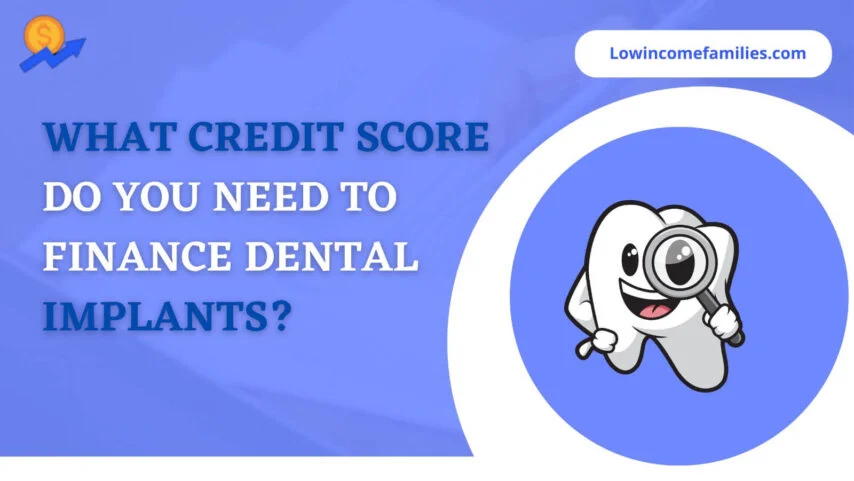What credit score do you need to finance dental implants? Dental implants are a major investment, and many of us don’t have enough cash to pay for them. But with careful planning and research, you can figure out how to finance them even if you have bad credit or low income.
In this article, we’ll discuss what credit score is needed to finance dental implants, explore how to get a loan with bad credit and provide information on free dental implants for those who qualify. Read on to find out more!
What Credit Score Is Required For Financing Dental Implants?
To finance dental implants, you will need a credit score of at least 650. This is because dental implants are considered a major financial responsibility and lenders want to see that you can make payments on time.

If your credit score is below 650, you may still be able to get financing for dental implants by using a cosigner or by applying for a short-term loan.
How To Get A Dental Implant Loan With Bad Credit And Low-Income?
There are a few things to consider if you have bad credit and low income and are looking to finance dental implants :-
- First, you must find a lender willing to work with you. A few specialized lenders cater to people with bad credit and low-income levels. These lenders may be more expensive than traditional lenders, but they may be more willing to work with you.
- Next, you will need to consider the terms of the loan. Most traditional loans for dental implants require good credit and a decent income.
- However, specialized loans are available for people with bad credit and low incomes. These loans may have higher interest rates and fees, but they can provide the financing you need for your dental implants.
- Finally, you will need to consider the loan’s repayment terms carefully. Many traditional loans for dental implants require monthly payments over several years.
This can be difficult for someone on a tight budget. Some specialized loans offer shorter repayment periods, making them more affordable for people with bad credit and low incomes.
Guaranteed Approval Credit Cards with $1000 Limit for Bad Credit & No Deposit.
If you have bad credit and low income and want to finance dental implants, there are a few things to consider :-
- Find a lender that is willing to work with you. Some specialized lenders cater to people with bad credit and low-income levels.
- Consider the terms of the loan carefully before signing anything. Make sure you understand all of the repayment terms before accepting the loan.
- Shop around to get the best terms and interest rates available.
Alternatives To Loans For Dental Implants
If you’re considering dental implants, you may be wondering if there are any alternatives to loans for financing your procedure. While loans are a common way to finance dental implants, other options are available. Here are a few alternatives to loans for financing dental implants:
$50 Loan Instant No Credit Check
-
Dental Insurance
Many dental insurance policies cover at least a portion of the cost of dental implants. If your policy does not cover the entire cost, you can use funds from a flexible spending account (FSA) or health savings account (HSA) to cover the remaining balance.
-
Credit Cards
If you have good credit, you can finance your dental implants with a low-interest credit card. Compare interest rates and terms before signing up for a new card.
-
Dental Saving Plans
Dental savings plans are similar to health insurance but typically have lower monthly premiums and offer discounts on dental procedures, including implants.
-
Personal Savings
If you have the financial resources available, consider using personal savings to pay for your dental implants. This is often the most affordable option in the long run, but it will require upfront payment in full.
-
Employer Assistance
Some employers offer financial assistance to employees needing medical or dental care. Check with your HR department to see if this benefit is available.
No matter how you finance your dental implants, it is important to understand all the associated costs and factors that may affect your decision. Be sure to speak with your dentist to get a full picture of the cost, benefits, and alternatives available.
Free Or Discounted Dental Services For Low-Income Patients
If you’re looking for free or discounted dental services for low-income patients, a few options are available:-
- Dental schools often offer reduced-cost services, and many dentists offer sliding scale fees based on income.
- Several government programs provide dental care for low-income individuals and families. Medicaid is the largest of these programs, but there are also state and local programs available in many areas.
Care Credit Solutions
If you’re considering dental implants, you may wonder what credit score you need to finance them. The good news is that there are many options for financing dental implants, even if you have bad credit or a low income.
One option is Care Credit, which offers to finance medical and dental procedures. Care Credit works like a credit card, so you can make monthly payments until your balance is paid off.
There’s no interest if you pay off your balance within the promotional period, making it a great option for those worried about accruing interest on their loan.
Another option for financing dental implants is to take a personal loan from a lender like :-
These loans typically have lower interest rates than credit cards so they can be a good option for those with bad credit or a low income. However, you’ll need to make sure you can afford the monthly payments, as missing payments can negatively impact your credit score.
Whatever financing option you choose, research and compare offer before making a decision. This way, you can be sure you’re getting the best deal possible and avoid any surprises down the road.
Health Savings Accounts (HSAs)
There are a few different types of financing available for dental implants, including health savings accounts (HSAs). HSAs are tax-exempt accounts that can be used to pay for qualified medical expenses, including dental implants.
To be eligible for an HSA, you must be enrolled in a high-deductible health plan (HDHP). Contributions to your HSA are made with pretax dollars, and any money left in the account at the end of the year rolls over to the next year.
Withdrawals from your HSA are tax-free if used to pay for qualified medical expenses. If you’re looking for a way to finance your dental implants with bad credit or low income, an HSA could be a good option.
Because contributions are made with pretax dollars, HSAs can help reduce your overall tax liability. And because withdrawals from HSAs are tax-free, you’ll be able to keep more of your hard-earned money in your pocket.
Conclusion:-
Finance options for dental implants vary widely between lenders and other financing institutions, often depending on credit score.
With proper planning and research into the different loan types available to those with bad credit or low income, it is possible to obtain a loan that fits your financial circumstances and dental needs.
It’s important to understand all the details of any offered loans before deciding so that you can make an informed choice about how best to finance your dental work.
Frequently Asked Questions
Are dental implants a good investment?
Dental implants are an excellent investment for your oral health. They are strong and durable and can last a lifetime with proper care.
What are full mouth dental implants?
Full-mouth dental implants are a great solution for those who have lost all their natural teeth.
Which celebrity has dental implants?
Celebrity George Clooney and Mike Tyson have dental implants.
Can dental implants be done in one day?
Yes, dental implants can be done in one day.
Who is not suitable for dental implants?
Children and teens are not suitable for dental implants.
What is the best age for dental implants?
The best age for dental implants is 18 or over.
Can your body reject dental implants?
Your body can reject dental implants if they are not placed correctly or if they cannot heal properly after surgery.











